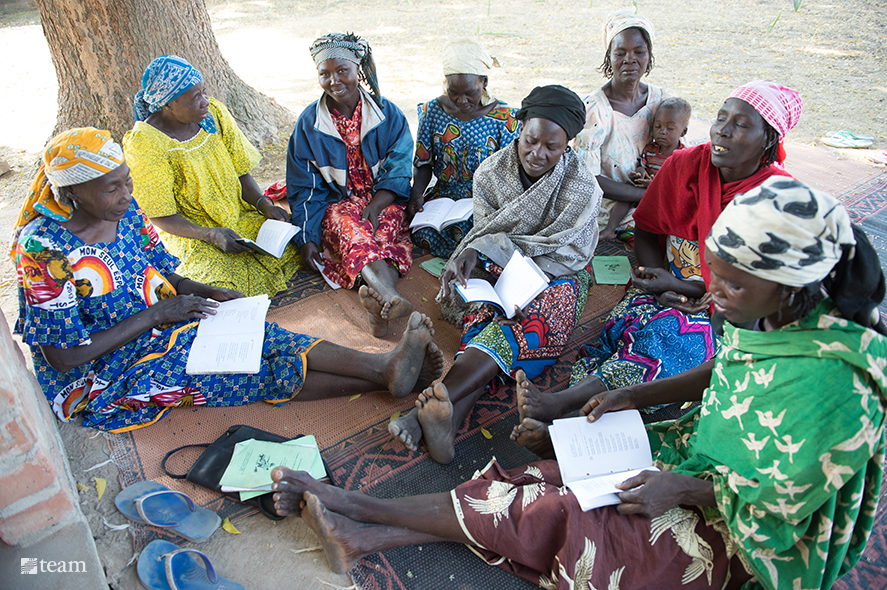
Prayer Focus
Empowering the Unreached: Education, Literacy, and Access to the Gospel
August 15, 2023
by Molly Little

Hebrews 4:12 states, “For the word of God is living and active, sharper than any two-edged sword, piercing to the division of soul and of spirit, of joints and of marrow, and discerning the thoughts and intentions of the heart.”
This powerful description highlights the dynamic and transformative nature of Scripture. It states that the Word of God has an inherent vitality and relevance that transcends time and speaks directly to the heart. As believers engage with the living word, it has the potential to penetrate deeply into their innermost being – revealing truths, convicting of sin, and offering guidance for an ever-closer walk with Christ.
This understanding reinforces the importance of promoting education and literacy, empowering individuals to directly access and experience the life-changing impact of the living Word of God. In this month’s Prayer Focus, we highlight the significance of education and literacy as a tool to open doors and further access to the Gospel while joining in prayer with and for global workers who dedicate themselves to this endeavor. They have an integral role in breaking down barriers, dispelling darkness, and nurturing a hunger for the redemptive truth of God’s Word. As we pray for literacy and education to further the accessibility of the Gospel, we align ourselves with God’s heart for all people to know Him and His love. Here are 5 ways to pray for literacy and education ministries as they provide Gospel accessibility to the nations:
1. Open Hearts and Receptive Minds
Pray for open hearts and receptive minds among the communities served by global workers.
In communities where the Gospel may be relatively unfamiliar or met with skepticism, global workers face the challenge of sharing the Good News in a culturally applicable manner. Pray for the softening of hearts and the opening of minds, so that the message of Christ’s love and salvation can take root and flourish. May God work in the hearts of individuals to embrace the Gospel and find hope and transformation through new faith.
2. Gospel-Centered Curriculum
Pray for the development and implementation of Gospel-centered curriculum in literacy and education programs.
Global workers understand that true transformation goes beyond academic knowledge. Pray that they can integrate biblical principles and values into their educational initiatives, fostering an environment where students can learn not only to read and write but also to encounter the life-changing message of the Gospel. May God inspire missionaries to develop curriculum materials that effectively communicate the love and teachings of Christ, touching the hearts of students and leading them toward spiritual growth.

Education and literacy programming is one of TEAM’s most enduring ministry types worldwide.
3. Discipleship and Mentorship
Pray for global workers to have opportunities for discipleship and mentorship, fostering a deeper understanding of the Gospel among their students.
Beyond providing basic literacy skills, global workers have the privilege of nurturing personal relationships with their students. Pray that they can act as mentors and disciples, guiding learners in their spiritual journeys. May God grant them wisdom and sensitivity to recognize moments when deeper spiritual discussions are needed, and may these interactions lead to a stronger faith foundation for those they serve.
4. Community Transformation
Pray that the efforts of global workers to share the Gospel through education will lead to community transformation.
Education and literacy can create a ripple effect that extends far beyond the individual. Ask God to bring positive changes in social dynamics, economic opportunities, and overall well-being, knowing that these changes not only transform lives in the temporal sense but also open doors for the eternal Gospel message to reach hearts and souls. May these communities become beacons of light, illuminating the path to Christ for generations to come.
5. Protection and Provision
Pray for the safety and protection of global workers as they navigate unfamiliar territories and cultural sensitivities.
Working in unreached and often challenging environments can expose global workers to various risks and adversities. Ask God to provide for their physical needs, emotional resilience, and spiritual stamina. Pray for divine connections and support networks that will uplift and sustain them as they persevere through difficult circumstances to share the hope of the Gospel with those who do not yet know it.
Interested in global missions and passionate about helping others learn? Find an opportunity that uses your skills for teaching, mentoring, and presenting the Gospel to further God’s Kingdom.
Click here to download a printable copy of this month’s Prayer Focus!


